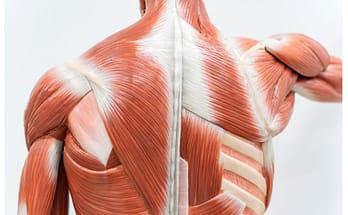If you’ve ever heard a popping or cracking noise from your neck, you might have wondered what it is and why it happens. Neck cracking has been around for centuries, with people like Plato and Aristotle describing various methods of neck cracking in ancient texts.
The noises during a neck crack are the result of the ligaments separating so that two bones in the neck can move slightly apart from each other. This separation allows for increased room for movement and flexibility of the head on top of the spine. However, this benefit does not come without some risks involved in performing such an action regularly.
What makes that cracking or popping sound
The popping sound you hear when your neck cracks is caused by the synovial fluid in your joints. Synovial fluid is a clear, viscous substance found in all joints and serves as a lubricant for movement. When two bones connected by ligaments move apart slightly, the pressure inside one of these joints decreases, and the pressure outside increases so much that it causes an audible pop.
The popping noise comes from air bubbles being released into this space between bones, which then quickly re-inflate once more pressure is applied to them. How can cracking your neck cause damage?
The truth is that it’s not the popping sound that causes damage to your neck but rather the force behind it. When you crack your neck, you put stress on the joints to create the popping noise. Over time, this can cause wear and tear on those joints, leading to cartilage damage or even bone spurs.
The Benefits of Cracking Your Neck
The most obvious benefit is that it feels good. The popping sound lets you know that your neck is releasing built-up pressure, and the feeling of relief can be quite satisfying.
In addition, cracking your neck has been shown to relieve headaches and migraines by increasing blood flow to the brain. The pressure that builds up in the neck can also cause headaches and migraines, so relieving that pressure can help to relieve symptoms of these conditions.
Cracking your neck may also help improve your posture by restoring proper alignment to your spine.
Some people also believe that cracking your neck will help relieve symptoms of anxiety and depression. The release of endorphins following the popping sound could have such an effect, even though it has not been proven.
Risks Associated With Cracking Your Neck
Cracking your neck may seem safe and easy to relieve tension and pressure. However, there are some risks associated with the practice, including:
Hyperextension injuries: Cracking your neck often produces a loud popping sound and can be painful if done incorrectly. If you apply too much force or bend too far forward, you could hyperextend your spine and injure it. The result can be pain, muscle spasms, and even paralysis.
Damage to the vertebrae: The bones in your neck are very delicate and easily broken if you apply too much force when cracking them. When you apply pressure to your neck, you can damage the vertebrae and cause pain or muscle spasms.
Decreased mobility: When you crack your neck, it can become stiff and difficult to move afterward. This is because the muscles in your neck are tight and need to be stretched out regularly for proper circulation.
Numbness or tingling sensation: This results from irritation of the nerves in your spine. See a doctor immediately if it persists for more than two days after cracking your neck.
Other Ways to Relieve Neck Pain
If you don’t want to crack your neck, there are other ways to relieve the pain.
- Stretching: You can stretch out your back and shoulders by moving your head in all directions.
- Massage: A massage therapist can help relieve tension in your neck and shoulder area.
- Ice pack: There are two ways to use an ice pack to relieve neck pain. You can apply it directly to the painful area, or you can apply it to the back of your neck and shoulders. There are two ways to use an ice pack to relieve neck pain. You can apply it directly to the painful area, or you can apply it to the back of your neck and shoulders. It will help reduce inflammation and swelling in those areas.
- Heat pack: A heat pack can also soothe soreness and swelling. If you are suffering from inflammation caused by injury or trauma, you should not use heat therapy since it can irritate already inflamed tissues.
- Medications: Several over-the-counter medications available at local pharmacies work well for people experiencing temporary pain relief, such as muscle relaxants or anti-inflammatories.
- Physical Therapy: Chronic neck pain caused by poor posture while working or playing sports may benefit from physical therapy. This type of treatment typically involves exercises designed specifically to strengthen certain muscles within your upper body, including those necessary to maintain proper alignment and stability so that future injuries don’t occur.
- Chiropractic Care: Chiropractors specialize in diagnosing mechanical problems such as misalignment between vertebrae within the spine, causing irritation that could lead to chronic conditions such as arthritis later down the line.
When You Should See a Doctor About Neck Pain
Cracking your neck may seem easy to relieve some discomfort, but it’s one of the worst things you can do. This motion could cause more harm than good because it’s likely to cause further damage to your neck and spine. While most people think that cracking their neck will help with their pain and stiffness, it only worsens things.
If you’re experiencing neck pain, you must see a doctor. Neck pain can be a sign of an underlying condition, such as arthritis or degenerative disk disease, which requires treatment to prevent further damage to your spine. If left untreated, these conditions can cause more severe problems, including chronic pain and even paralysis.
If you’ve been experiencing neck pain and are wondering whether or not to crack your neck, the answer is no. Cracking your neck can cause more harm than good because it’s likely to cause further damage to your neck and spine. While most people think that cracking their neck will help with their pain and stiffness, it only worsens things.
Cracking your neck can increase the risk of developing problems with your neck, but it’s not just the cracking that can cause harm. Cracking your neck can also damage your spine and joints because it creates stress that they weren’t designed to withstand.
If you have pain in your neck or back, don’t try to fix it yourself by cracking your neck. Instead, see your doctor to determine the cause of your pain and how to treat it.
The best way to avoid neck problems is by doing exercises that strengthen and stretch your neck muscles. When you need them most, they will be strong and flexible to support your head.




